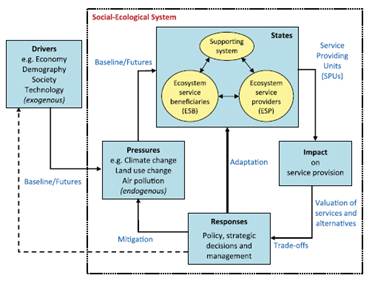Post a comment on the text below
The Framework for Ecosystem Service Provision (FESP) assesses environmental change driver impacts on ecosystem services and to subsequently identify the most relevant mitigation or adaptation strategies (see figure 3.1). The approach is based upon the DPSIR (Drivers-Pressures-States-Impacts-Response) framework (Stanners et al. 2007) and incorporates the concept of the social-ecological system, whereby human society and natural systems are directly linked. Population and associated economic growth act as driving forces for pressure upon the environment, and society can monitor and evaluate intervention measures. The resulting states and impacts upon the environment have direct implications for human health, development and well-being. Yet providing robust assessments of such potential environmental states and impacts is, however, not a simple process due to the complexity of the interactions in between ecosystem (natural capital), economy (produced capital) and human well-being (social and human capital). The intrinsically link in between these 3 types of capital are central in most interpretations of what Green Economy is and at the core of these links is a dual challenge of (EEA 2012d):
- ensuring ecosystem resilience of the natural systems that sustain us (and limiting pressure on natural systems so that their ability to function is not lessened);
- improving resource efficiency (and reducing the environmental impacts of our actions).
Figure 3.1 Framework for Ecosystem Service Provision (FESP)

Source: Harrison and Rubicode Consortium 2012
You cannot post comments to this consultation because you are not authenticated. Please log in.


